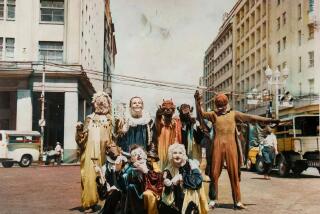Living through the lens
- Share via
“I do not make films, I just film,” says Jonas Mekas, somewhere around the midway point of his four hour and 48 minute cinematic reverie, “As I Was Moving Ahead Occasionally I Saw Brief Glimpses of Beauty.” One of the most important living avant-garde filmmakers in America and one of the art’s most tireless champions, Mekas, who turns 80 later this month, has been shooting and splicing nonstop for more than half a century. From the moment he bought a Bolex camera in 1950, filmmaking has not only been his passion, it has been his way of living in the world.
As with Mekas’ greatest films -- diaries such as “Reminiscences of a Journey to Lithuania” and “Lost, Lost, Lost” -- the new work is an exaltation of the quotidian, about finding the divine in the everyday. Shot in 16-millimeter, the film is composed of hand-held images that rhythmically leap forward and backward in time, creating a memory loop that continually takes us from the early 1970s (and sometimes even earlier) through the 1980s and back again. Divided into chapters and punctuated by an occasional typed title card, much of the footage is devoted to the early years of Mekas’ marriage, when his two children were very young, but this is no mere home movie. Rather, it is a vision of life as a domestic utopia and a bohemian idyll -- joyous, generous, enviable, ecstatic.
Hour after entrancing hour, we watch the Mekas family alone -- eating, reading, laughing, walking and playing -- as well as in the embrace of close friends, accompanied by the filmmaker’s intermittent voice-over and snatches of music.
Light flares periodically flood the pictures and every so often we hear Mekas fumbling with the tape recorder, handmade touches that underscore the deeply personal nature of the filmmaking. At one point, Mekas turns the camera around to show us a young man feeding brioche to a stray cat and, sometime later, the old man who’s making this film. Addressing us as “my dear friends” in the manner of a 19th century novelist, he explains that he and his wife, Hollis, are the film’s protagonists, a clarification that becomes all the more touching if you also know that they are now separated.
Born in Lithuania, Mekas immigrated to the United States in 1949 with his filmmaker brother, Adolfas, after having spent time in a Nazi labor camp. In 1955, he began publishing the influential magazine Film Culture, in which you could read articles by critics Pauline Kael, Andrew Sarris and Manny Farber (all in the same issue!); three years later, he became the film critic for the Village Voice.
In between writing stints, he launched the Film-Makers Cooperative, a nonprofit film rental library, and founded Anthology Film Archives, arguably the most valuable screening venue in New York City. Along the way, he also completed some two dozen intensely personal, mostly nonnarrative films that, if he hadn’t committed such missionary zeal to the cause of avant-garde cinema, might have brought him the artistic acclaim he deserves.
Mekas has a genius for finding the right image -- one of the most heartbreakingly beautiful is of his young daughter sitting next to a vase of flowers, her head bobbing in sunshine close to the blooms -- but it’s how the pictures flow together that gives the work its power. A bowl of blueberries, a pear on a plate, a pink flower against a green field, a child toddling toward the camera and a woman smiling in bed are not only glimpses of beauty, they are the fragments from which lives were built.
However rapturous, memory is the ghost that haunts us all. For Mekas, the ghosts will always be welcome because making images was never an escape from the world but a way more deeply into it, even now. “Nothing happens in this film,” says the old man. Nothing -- and everything.
*
‘As I Was Moving’
What: ‘As I Was Moving Ahead Occasionally I Saw Brief Glimpses of Beauty’
MPAA rating: Unrated
Times guidelines: Some nudity; images of a child being born
When: Sunday. Parts one and two, 4 to 7 p.m.; parts three and four screen, 7:30 to 9:45 p.m.
Where: Filmforum at the Egyptian Theater, the American Cinema- theque, 6712 Hollywood Blvd.
Information: www.filmforum.org.
More to Read
Only good movies
Get the Indie Focus newsletter, Mark Olsen's weekly guide to the world of cinema.
You may occasionally receive promotional content from the Los Angeles Times.








